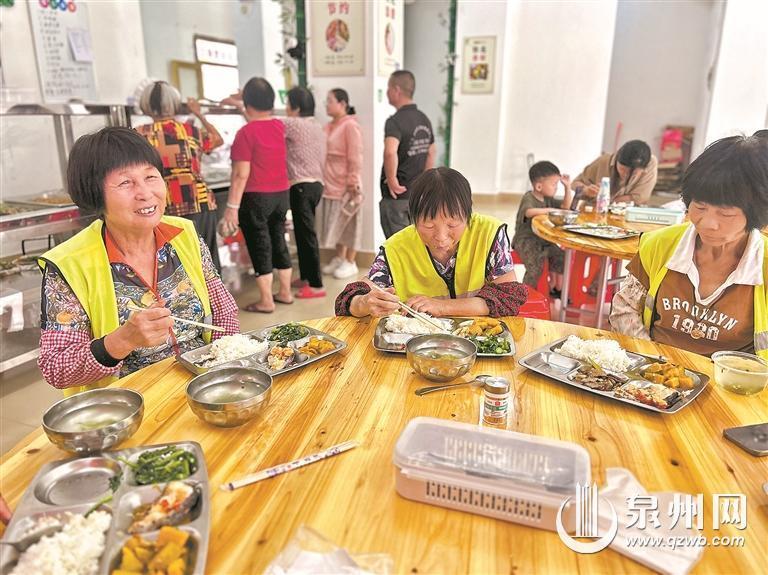- About
- Sustainability

The senior-friendly canteen not only provides meals for the elderly but also offers specially prepared meals for sanitation workers and other community members in need.
Recently, the enticing aroma of freshly prepared dishes filled the air at the Mao Mountain Community canteen in Liucheng, Nan'an. Elderly residents queued up for lunch, while young families sat together around shared tables, chatting and enjoying their meals. Nearby, children played freely in a designated kids' corner, transforming the canteen into a warm and welcoming community living room.
More than just a senior canteen, this initiative showcases an innovative approach to grassroots community governance. By combining public welfare with sustainable commercial practices, the canteen ensures the long-term operation of meal services for the elderly while moving beyond the conventional scope of elder care. Open to residents of all ages, the canteen promotes a "meals-for-kindness" concept, where each meal purchased contributes to supporting others in the community. A portion of the revenue is reinvested into a community welfare fund, creating a virtuous cycle that benefits both older residents and vulnerable groups. In this space, shared meals foster neighbourly connections, ease everyday tensions, and quietly foster a new model of inclusive and participatory community development.
Broadening the Scope of Elder Care: Clean, Affordable Meals for All Generations
Located near the community committee office, the canteen is bright, clean, and well-organised, with clearly designated zones for food service, dining, and children's play. Heartwarming slogans such as "One meal, one act of kindness" and "Dine with love, walk with warmth" are displayed throughout, reflecting the canteen's mission.
By 11:30 a.m., lunch was ready—steamed egg, fish, sautéed greens, pumpkin, stir-fried pork liver, and more. The variety and aroma drew more than ten residents, including elderly individuals, young adults, and children, to queue for meals.
Mr. Huang, who works nearby, said, "I recently found out that the canteen is open to all age groups, not just seniors. I came to try it and was impressed by the pleasant environment and affordable pricing. It feels good to know that each meal also helps someone else." Ms. Chen Aiyue, 73, added, "It's difficult to cook just for one person at home. Here, the meals are convenient, nutritious, and clean." Strangers and neighbours alike share round tables, enjoying meals and friendly conversation. Children who finish eating head to the adjacent play area. More than 40 children from a local summer camp also benefit from the canteen's nutritious meals.
Coincidentally, that day marked the canteen's monthly event to serve complimentary meals to sanitation workers. Seven of them gathered to enjoy a free lunch together. "It's our second time here," said Ms. Wang Fen. "Three dishes and a soup—meat, fish, and vegetables. It's really heartwarming."
According to Ouyang Kaiming, Party Secretary of Mao Mountain Community, the canteen is open to the public. Breakfast is priced at 5 RMB, while lunch and dinner cost between 8 to 14 RMB. Both dine-in and takeaway options are available. Seniors aged 75 and above receive a 200 RMB subsidy for every 200 RMB topped up; those aged 60–74 receive 100 RMB; and low-income households receive 50 RMB. Vulnerable groups—including low-income families, isolated seniors, retired veterans, party members, and sanitation workers—can enjoy periodic access to complimentary meals.
Innovating Community Governance: Balancing Social Good and Business Sustainability
Why expand a senior canteen into a space shared by all age groups? Ouyang explained the original motivation. In recent years, many communities across China have launched elder-friendly canteens to improve the quality of life for older adults. Mao Mountain Community aimed to do the same. However, traditional funding models—government subsidies, community funds, and charitable donations—are often unsustainable, particularly with a growing elderly population of nearly 1,900 residents aged 60 and over.
For the canteen to thrive long-term, Ouyang believed it must become self-sustaining. He envisioned a model based on the integration of public welfare and business principles: "Let public welfare lay the foundation, and let business operations bring it to life." By serving nutritious, affordable meals to people of all ages—from children to seniors—the canteen addresses daily meal needs while rekindling a sense of neighbourhood solidarity.
When Ouyang discussed this vision with local community volunteer Ouyang Shaobo, they immediately agreed. After more than six months of preparation, the canteen officially opened to the public on June 3. Residents are encouraged to "order a meal, offer kindness." A portion of the profits supports activities such as birthday celebrations for seniors, free meals, and community welfare projects including student assistance and facility improvements.
"The initiative has received strong support from residents," said Hong Hengyi, Deputy Director of the Liucheng Subdistrict Office and liaison to Mao Mountain Community. He noted that the project has redefined the traditional model of elder care by transforming a single-use facility into a vibrant, multi-generational service platform. This not only ensures the sustainability of services for seniors but also fosters a warm, inclusive atmosphere across the entire community. More significantly, the canteen has emerged as a new hub for community governance—guided by Party leadership, enabled by resident participation, and supported by shared public services.
Through this effort, Mao Mountain Community is paving a new path for tackling the challenges of an ageing population—one warm, meaningful meal at a time.
